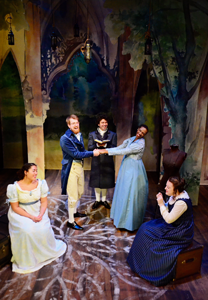From ChicagoOnstage.com
Lifeline’s “Emma” is a clever, utterly hilarious joy
June 5, 2019
By Karen Topham
HIGHLY RECOMMENDED
As a lifelong Jane Austen fan, I have always found Emma, the story of a young aristocrat whose well-intentioned meddling in the lives of everyone around her does far more harm than good, to be her most overtly comical book. Emma’s firm belief that she is an excellent matchmaker, based solely on one dubious success, gives this young woman a raison d’etre and carte blanche to try it again and again, making the most egregious mistakes and ignoring what is right in front of her in a very humorous satire of the upper class of the Austen era. Loaded with indelible characters and witty dialogue, Emma is Austen at the top of her game.
And then along comes Lifeline Theatre’s new adaptation of the novel, written by Phil Timberlake and directed by fellow ensemble member Elise Kauzlaric, which somehow manages to make the novel even more hilarious with creative characterizations, witty staging, and an inventive format that keeps the audience completely engaged while allowing the cast to strut their collective stuff. Timberlake and Kauzlaric have upped the comic ante by adding broad visual humor to the usual Austen mix. With a cast of only five portraying a dozen different characters, often trading off roles mid-dialogue even to the extreme of one actor having conversations with herself, this Emma is a brilliant and ebullient joy of a production.
It’s also a play that allows its ensemble to outshine its lead, even though Emma Sipora Tyler is excellent and expressive as Emma Woodhouse. But Tyler has only a single role to play and so does not get to venture into the outrageous and frantic role-switching that takes place elsewhere. Using only voice changes and exaggerated hand gestures (and a cane for Emma’s father), the other four performers play multiple roles irrespective of gender, costume, and which of them may have established the character. Timberlake’s script allows the simple expedient of direct address to keep them all straight, and the actors do the rest. The result is manic and marvelous, an Emma that pushes all the right buttons and manages to make a familiar story new again.
The ensemble is amazing. Maddie Pell plays Harriet Smith and others, and you couldn’t ask for a more flexible actress: as the play went on, I found myself able to distinguish her multiple characterizations in a millisecond based on her facial expression alone, even before I noted the playful physicalizations attached to each role. Cory Williamson portrays Mr. Knightly and others, allowing him to have much more fun than playing the internalized emotions of the “superior” man alone would give him. His rapid switches from Knightley’s stolid personality to various more broad and effusive characters is a never-ending delight. Similarly, Jeri Marshall’s calm, accomplished Jane Fairfax gives way to an over-the-top, extravagant portrayal of the singular Mrs. Elton. Peter Gertas, who plays both Frank Churchill and Mr. Elton along with others, is equally enjoyable in his rapid switches between roles.
This is not any kind of traditional adaptation, and Timberlake and Kauzlaric (as well as the cast) clearly had fun putting it together. The director had her work cut out for her: just keeping track of who was to play whom when must have required a lengthy spreadsheet, let alone envisioning ways to make the transitions work without getting repetitive and keeping the characters clear to the audience. There are many wonderful moments, such as Pell’s hilarious one-actor dialogue between Harriet and Miss Bates or Williamson’s stage left exit as the staid Mr. Knightly followed by what seemed an instantaneous stage right entrance as the loud and friendly Mr. Westin. Meanwhile, Tyler’s likable, focused presence as the title character holds everything together with her direct commentary on the action and her own slow self-discovery.
You don’t have to be a fan of the genre to enjoy this Emma. There are lovely period costumes by Ali Renee Amadei and period music by Andrew Hansen, but this is Austen for everyone. It is simply a joy to watch this play.
From The Chicago Tribune
‘Emma’ at Lifeline Theatre: Jane Austen’s matchmaking story is played for warmth and laughs
June 8, 2019
By Kerry Reid
★★★
Back before Tinder and OKCupid, making a suitable match — for single men in possession of a good fortune and the single women depending upon finding them — was a fraught proposition. One might well be tempted to rely upon the advice of a well-meaning friend to steer them to a safe marital harbor. That might not always be wise. But in Phil Timberlake’s sprightly adaptation of Jane Austen’s 1815 novel Emma, now onstage with Lifeline Theatre under Elise Kauzlaric’s nimble direction, it’s undeniably fun.
Timberlake makes his Lifeline playwriting debut with this piece, and the ensemble features several actors new to the company’s stage, including Emma Sipora Tyler, a recent grad of Roosevelt University’s Chicago College of Performing Arts, in the title role. She’s surrounded by four other actors who, in addition to each playing one major role all on their own, also switch all the subsidiary characters among themselves — often by donning a pair of glasses or ostentatiously opening a fan.
If you’ve never read Austen’s original or seen any of the many film adaptations (a new one, directed by fashion photographer Autumn de Wilde, is reportedly in the works), this device may take a few minutes to adjust to as you sort out who’s who in Highbury. But both Timberlake’s script (which dispenses with any narration and uses only a few instances of mostly unnecessary direct address from Emma to the audience) and Kauzlaric’s sharp staging (which uses a minimum of set pieces to keep the action humming along) soon place us right at home in Emma’s world.
As Sarah Lewis’ set design — arches covered with paintings of lush greenery — suggests, this Surrey backwater is a soft, bucolic place. Rigid aristocracy — such as the fearsome Lady Catherine de Bourgh, who threatens to thwart Elizabeth Bennet in “Pride and Prejudice” — doesn’t enter the picture here. Perhaps that is why the class differences, though certainly present, don’t seem to exert the same relentless pull as in Austen’s earlier novel.
The interchangeability of the smaller supporting characters enhances this sense of social fluidity — at any moment, someone else can turn into the impoverished talkative spinster, Miss Bates, or Mr. Woodhouse, Emma’s hypochondriacal father. Small wonder, then, that Tyler’s Emma can’t see any reason why her orphan friend, Harriet (Madeline Pell, in an endearingly naifish performance) shouldn’t set her sights on Mr. Elton (Peter Gertas), the town vicar.
Mr. Elton fancies Emma instead — and the recurring theme of the novel and this play is that Emma, despite her good intentions, isn’t just terrible at figuring out love matches for her friends. She’s also hopeless at reading cues from the men around her, including the plainspoken but goodhearted Knightley (Cory David Williamson), who tries to set her straight.
For the most part, this is all played for warm laughs. Tyler’s performance felt a bit hesitant at first on the night I attended, but she brings unaffected charm to her Emma, which is key. Truthfully, Emma doesn’t possess the same inner depths as Elizabeth Bennet. Austen reportedly said, before writing the novel, “I am going to take a heroine whom no one but myself will much like.” But it’s hard not to like Tyler’s Emma. Much like Alicia Silverstone’s Cher in “Clueless” (for my money, the film version most faithful to the spirit, if not the times, of Austen’s original), she’s not spiteful.
Even her harshest moment — a cutting gibe to the kind but annoying Miss Bates — registers here as, well, clueless more than cruel. Tyler’s Emma isn’t out for blood. She’s sheltered and sometimes silly in her single-minded passion for matchmaking, but she’s not scheming. We root for her to figure it out.
We also root for the rest of the company to pull off the quick transformations, and Kauzlaric’s cast — which also includes the wry Jeri Marshall as Jane Fairfax, the effortlessly graceful niece of Miss Bates who inspires Emma’s envy — is quite equal to the task. There are several amusing running gags in the staging, such as Miss Bates’ elderly mother being played by a dressmaker’s dummy, and tall floor lamps standing in as guests at a ball.
This Emma takes a little while to find its feet, but like its heroine, its flaws can be overlooked because it’s so eager to please — while finding unexpected moments of insight amid the romantic misunderstandings.
From Picture this Post
Lifeline Theatre Presents EMMA Review – Misadventures in Matchmaking
June 4, 2019
By Harold Jaffe
HIGHLY RECOMMENDED
In sharp contrast with the grief and horror of Frankenstein or the absurdist satire of The Man Who Was Thursday, Lifeline Theatre closes out their 2018-19 season with a vivacious and charming production of Jane Austen’s comedy of manners Emma. In this writer’s view, both lifelong Austen lovers and first-time fans will find something new to enjoy in this world premiere adaptation by Lifeline company member Phil Timberlake.
Deeply Human Lead Anchors Show
“Vivacious and charming” could also just as well describe the show’s eponymous Miss Woodhouse, brought sprightfully and delightfully to life by Emma Sipora Tyler. Tyler infuses her character with both joie de vivre and reckless self-confidence. While it certainly does appear in individuals of every age and social class, this kind of confidence often seems to be least tarnished by experience in young people from well-off backgrounds. Tyler keeps Emma’s sense of nigh-infallibility carefully balanced on the border of endearing and exasperating.
The character’s assurance is not entirely unfounded: as the story starts, her dear friend and former governess Miss Taylor has just wed the widower Mr. Weston after Emma herself had introduced them.
Naturally, she concludes, she must have have a rare and splendid talent for matchmaking, and to refrain from exercising it further (on every eligible individual she encounters) would be grave negligence. The notion that her instincts for romantic compatibility might be less than flawless does not cross her mind.
“I am going to take a heroine whom no one but myself will much like,” wrote Jane Austen of this proud, headstrong young woman. While it is true that among Emma’s many amiable qualities are some distinct weaknesses of character, Austen’s words, Lifeline company member Elise Kauzlaric’s direction, and especially Tyler’s nuanced portrayal yield a protagonist audiences may find impossible not to like.
Lifeline Theatre Actors Juggle Roles Dizzyingly, Brilliantly
For all the main character’s vividness and charisma, though, the play would be nothing, in this writer’s view, without its supporting cast, and the other actors deliver in spades. In Timberlake’s adaptation, just four actors portray the other characters, about a dozen of them in all.
What is remarkable about this is that, save a handful of roles played exclusively by one actor, most of these characters are bounced around to whichever performer happens to be available in a given moment. So while Mr. Knightley, Emma’s close friend and (attempted) voice of reason, is always played by Cory David Williamson, in another scene Williamson might be Mr. Weston or hilariously loquacious family friend Miss Bates. Jeri Marshall is principally Emma’s genial yet envied contemporary Jane Fairfax, but at the drop of a hat could herself be Miss Bates or the rich and vulgar Mrs. Elton.
Some viewers may find this rapid switching about of the supporting parts a touch perplexing for the first scene or two. Yet as the conceit becomes familiar, the flexibility with which Williamson, Marshall, Peter Gertas, and Madeline Pell jump from role to role, coupled with the remarkably consistent details of manner and speech used to distinguish each role, allow the four of them to create a richly varied community.
Set amidst the pastures and parlor rooms of Regency England, Emma’s relationships with each of these individuals give both life and depth to her misadventures in matchmaking. While the title character at times is preoccupied with the superficial, Lifeline Theatre gets right to the heart of a comedy that is all about digging under the surface.
From Broadway World Chicago
EMMA at Lifeline Theatre
June 9, 2019
By Emily McClanathan
RECOMMENDED
“I am going to take a heroine whom no one but myself will much like.” So Jane Austen famously prefaced the vivacious Emma Woodhouse, whom she describes as “handsome, clever, and rich” in the opening words of her 1815 novel. Indeed, Emma, the meddlesome, would-be matchmaker is arguably the most controversial among Austen’s canon of beloved protagonists. Yet, love or hate the leading lady, EMMA features many of Austen’s most amusing supporting characters, and here is where Lifeline Theatre’s production of this romantic comedy thrives.
In Phil Timberlake’s new adaptation, directed by Elise Kauzlaric, five actors share a dozen characters, with the exception of Emma Sipora Tyler, who plays Emma Woodhouse throughout. In the small English town of Highbury, Emma lives alone with her doting, elderly father and spends her abundant leisure time interfering in the love lives of her friends and neighbors. Her efforts cause more harm than good and blind her to the wishes of her own heart, until Emma reforms her ways and, Austen-like, everything wraps up tidily with several weddings.
Not only does each ensemble member portray multiple characters; in addition, individual supporting roles are often shared among multiple actors. This may sound like a recipe for confusion, but Cory Williamson, Peter Gertas, Maddie Pell, and Jeri Marshall make the rapid-fire shifts not only clear, but also highly entertaining. Some exchanges are reminiscent of improv games or acting warm-ups. For example, the toss of a cane indicates a passing of Mr. Woodhouse’s role from one actor to another, with the second actor immediately adopting his stooping gait and worried air.
Employing another classic comedic device, a single actor occasionally switches back and forth between two characters in conversation with each other. In one memorable scene, Maddie Pell, a promising young character actor, hops up and down as she flips between Miss Bates, a good-hearted but silly spinster, and Harriet Smith, Emma’s amiable but less-than-bright protégée. There are also several sly nods to this adaptation’s small-ensemble format. For instance, Harriet innocently observes that Frank Churchill “looks a bit like Mr. Elton” (Peter Gertas plays both characters).
In this production, the strong supporting ensemble outshines the protagonist. Granted, Emma Woodhouse is a slippery role. Despite Austen’s disclaimer that people would not like her heroine, my favorite portrayals of Emma are honest about her faults but also reveal her redeeming qualities: infectious enthusiasm for life, devotion to her father, liberality (within limits) in her choice of friends, and, ultimately, willingness to mend her mistakes. At Lifeline Theatre, I’d like to see more of these qualities in Emma, as well as higher emotional stakes: for example, her fiery temper in her tiffs with Mr. Knightley and her run-ins with the pompous Mr. and Mrs. Elton. This is not to fault actor, director, or adapter in entirety; a runtime of two hours (including intermission) makes it impossible to match the thorough character development of a classic novel. However, the balance between title character and comedic supporting roles could be more even.
Overall, Lifeline Theatre’s EMMA capitalizes on the humor and wit of Jane Austen in a clever piece of ensemble theater. Austen aficionados and newcomers alike should find plenty to enjoy in this light romantic comedy. EMMA can respectably take its place in Lifeline’s long-running tradition of adapting classic literary works for the stage.

 EXTENDED through July 28, 2019!
EXTENDED through July 28, 2019!
















